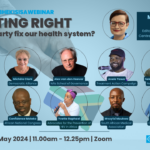| Universal access to healthcare | Climate change | Food security |
| Social grants | Basic income grant | Tuberculosis |
| HIV | Corruption | Gender-based violence |
Here’s what the Democratic Alliance says about health issues.
Universal access to healthcare
The DA says the government’s National Health Insurance (NHI) scheme should be dropped in favour of the party’s health plan. The DA’s model has the same goal as the NHI — to give all South Africans access to the same set of health services for free — but will achieve this differently. The NHI Fund will be like a massive, state-funded medical aid and will make it illegal for private medical schemes to fund the same health services as the NHI. The DA’s Universal Healthcare Coverage model, on the other hand, will allow medical aids to exist in their current form, but introduce a state-run “gap cover” (called social reinsurance), which will pay for costs medical schemes don’t, and to which all medical schemes will have to subscribe. The DA will also get medical aids to do something called “risk equalisation”, which means schemes will have to transfer funds among the different plans they offer in order to cover all members’ health costs. Universal health coverage is a 2030 sustainable development goal. The DA’s NHI model referred to in its manifesto is different from their previous model, the Sizani Universal Access to Healthcare Plan, and is drawn from their new health policy, which will be launched after the election. “We have updated our research and interacted with industry experts to develop a credible alternative to the National Health Insurance. There is no public link to it because it is in the drafting phase,” says DA spokesperson Math Cuthbert. While Sizani introduced healthcare vouchers to achieve universal healthcare coverage, the new model builds “on the findings and recommendations of the Health Market Inquiry and attempts to build on existing capacity in the public healthcare system while addressing market failures in the private healthcare system,” says Cuthbert.
As part of its universal access to healthcare policy, the DA government will put a system of “post-retirement protection” in place for pensioners, which will use cross-subsidies to lower pensioners’ medical aid premiums, so that they can afford to belong to their chosen medical schemes lifelong. There will also be cross-subsidies for lower-income groups, but instead of directly giving the subsidies to individuals, these would be “given indirectly to the medical insurance plans they are a part of”.
The DA says its government will implement its plan for universal access to healthcare over five years of being elected into power. The party doesn’t provide a budget for the plan in its manifesto, but in its health policy document it says: “The problem with public health in South Africa is not primarily a matter of money”, but with “health outcomes” and “mismanagement”.
The DA will create a “national health workers plan” to flag skill shortages and get universities, colleges and provincial health departments to work together to prevent mismatches in supply and demand that could result in unemployed graduates in the field of health. The party will amend the National Health Professions Bill to allow medical students to choose between doing their two-year internships and one-year of community service at government or private hospitals (currently all these have to be performed at government health facilities). The DA doesn’t provide a timeline for this in its manifesto.
The DA says it will speed up bureaucratic administrative processes, which delay the fixing and upkeep of health facilities, by giving hospitals and clinics the budgets and authority to pay for upkeep directly, and also to manage the process. Currently, the public works department funds and manages upkeep at public health facilities. The DA will get the country’s clinics and hospitals, both private and public, to provide quality services by allowing the Office of Health Standards Compliance (OHSC) to assess government and private facilities (so far, only public facilities have been evaluated). The results, they say, will be made public (the OHSC’s evaluations are currently also made public) and facilities that are not up to scratch will be fined.
A DA government will make more safe drinking water available by treating more wastewater for reuse, the party says. It will also improve the quality of treated water by using effect-based methods to ensure that chemicals used to clean water interact with each other in a way that makes the water safe. A specific timeline or budget for this isn’t given in the party’s manifesto.
Click here to go to the elections manifesto analysis tool.
Climate change
DA will make renewable energy (eg, wind and solar power) easier to be used, so that its government will be less reliant on Eskom. To do this, the party will invest in setting up local factories for making solar panels and other equipment used to produce power from renewable energy and it will reward institutions who train people in this field. The effects of climate change — a hotter Earth and more droughts and storms — as the result of our burning coal, oil and gas, will increase lung diseases, make HIV and TB spread faster, and allow diseases transmitted by insect hosts, such as malaria, to spread to countries where they’ve never been experienced before.
Import taxes on solar panels and other green energy gear will be reduced and people who install solar systems and feed-in meters, which measure how much electricity their solar systems produce to feed back into the grid and for which the government will pay them, will receive one-off tax rebates. An implementation timeline and budget for this isn’t provided in the party’s manifesto.
The DA says it’s committed to getting the country to net zero carbon emissions by ensuring that South Africa can use a mix of energy sources to power our lives. Net zero means the amount of greenhouse gases we emit (which mostly come from burning coal, oil and gas for producing electricity or fuelling vehicles), balances out with the amount the Earth’s ecosystems can naturally absorb, so that there’s no build-up of these gases in the atmosphere where they form a layer that traps heat and results in the Earth heating up. To keep global warming, as a result of too many greenhouse gases pumped into the air, to a level at which the Earth continues to be liveable, greenhouse emissions need to be reduced by 45% by 2030 and we need to reach net zero by 2050. More than 190 countries, including South Africa, signed up to the Paris Agreement to reach these targets. Each country has individual targets that feed into the global target, depending on how much they contribute to climate change. You can see South Africa’s targets here.
Click here to go to the elections manifesto analysis tool.
Food security
The DA will reduce hunger by exempting more foods from VAT and so make them more affordable. The food items listed include bone-in chicken, beef, tinned beans, wheat flour, margarine, peanut butter, baby food, tea, coffee and soup powder.
Click here to go to the elections manifesto analysis tool.
Social grants
A DA government will increase child support grants to South Africa’s official poverty line, pushing the amount up from the current R530 to R760. The food poverty line is the smallest amount of money someone needs per month to buy enough food for a healthy diet. The DA says if this is implemented in the next financial year, it will cost an additional R39.6-billion in funding per financial year for the existing 13.2-million recipients. The party believes the national treasury could find the additional money if the government roots out corruption, cuts waste and generates savings.
The DA will also give child support grants to pregnant mothers (and their unborn babies). Research shows that the babies of moms-to-be who don’t eat well during their pregnancies, are often born underweight and develop poorly later in life. The DA doesn’t specify at which stage of a pregnancy such a grant would be introduced, nor do they say when they will implement this or how much it would cost.
A DA government will allow private doctors to assess people for disability grants, to shorten the waiting period for getting an assessment spot at a government doctor.
Click here to go to the elections manifesto analysis tool.
Basic income grant
The DA will look at ways to better use South Africa’s tax income to address unemployment if voted into power and will fund a job seekers grant (which will replace the current social relief of distress grant). Recipients would need to provide proof that they’re making an effort to find a job (eg, that they’ve gone for interviews). The party says the grant will only be viable if the economy grows and there’s enough tax income to fund it. The party won’t increase any tax to fund the grant, but instead will identify how to save money and find better ways to spend tax income.
Click here to go to the elections manifesto analysis tool.
Tuberculosis
The DA doesn’t include a specific plan to address HIV or tuberculosis in its manifesto, but does refer to both diseases in its current online health policy document (a new document will be launched after the elections). TB is South Africa’s most deadly disease and 12.7% of adults in South Africa were infected with HIV by the end of 2022.
Click here to go to the elections manifesto analysis tool.
HIV
The DA doesn’t include a specific plan to address HIV or tuberculosis in its manifesto, but does refer to both diseases in its current online health policy document (a new document will be launched after the elections). TB is South Africa’s most deadly disease and 12.7% of adults in South Africa were infected with HIV by the end of 2022.
Click here to go to the elections manifesto analysis tool.
Corruption
To reduce corruption, the DA will create an “independent watchdog for health entities” (also called supervisory structures), which will manage all regulators, big hospitals, health services and health districts. The watchdogs will have the powers to supervise procurement processes, oversee human resource matters and appoint and remove the chief executives (the chief executives will report to the watchdog of an entity). The party will establish “an independent National Health Appointments Authority to guarantee the autonomy” of watchdogs. This authority will handle supervisory structure members’ nomination, appointment, as well as removal processes, “moving these responsibilities away from the executive” (in other words, removing the health minister’s powers to influence such appointments or removals).
Click here to go to the elections manifesto analysis tool.
Gender-based violence
The DA will invest in training health workers to treat victims of gender-based violence (GBV) with dignity. They will, for instance, be trained in how to use screening tools to spot GBV cases and how to report such cases to the police, and appoint people to attend court proceedings to see what hinders investigations, prosecution and court processes for crimes such as rape. No specific timeline or budget for this plan is given in the DA’s manifesto.




